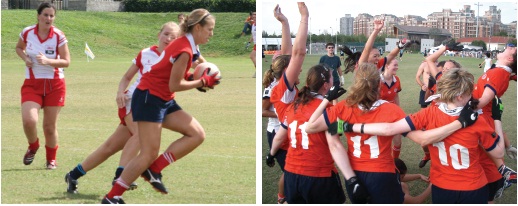by Andrew McKirdy
When football megastar David Beckham announced in January he had signed a deal to play for US-side LA Galaxy, the sport as a whole saddled up for another charge into the last frontier. America, the final pocket of resistance to football’s global appeal, was finally going to wake up and lace up its boots.
Whether a fading ex-England captain and his singer/model/actress/whatever wife are the people to convert the American public to the sport remains to be seen, but further down the glamour chain, a group of players are doing their bit to bring football a bit of recognition here in Japan. The football they play, however, is of a less well-known variety. And for the members of the Japan Gaelic Association, it might take more than a pair of Jackie O sunglasses and a tan to spread their message.
Gaelic football is one of the oldest sports in Europe. Hugely popular in Ireland, it is best described as a distant cousin of Australian Rules, a hybrid of rugby and football.
Points are scored by kicking or punching the ball over or under the posts, after working the ball around the field with a variety of passes, kicks and bounces. The sport differs from its closest relatives by use of the “solo,” a move where a player drops the ball onto their own foot whilst running, before kicking it back up into their own hands. With only three steps allowed while carrying the ball, the solo is the skill that allows for fast attacking play, and offers an opportunity for defenders to steal the ball to launch a raid of their own.
Louise Keane and her teammates know the move well. Their Tokyo-based club has established a foothold for the sport in Japan, running teams for both men and women to compete against other sides within the country and beyond. The sport has a small but enthusiastic following in Japan and the rest of Asia, and according to Louise, a software consultant from England now living in Tokyo, it continues to expand. “Every year we have the Asian Gaelic Games,” she says. “It is in its 13th year this year, and it is being held in Singapore. It was started by a group of young Irish lads living in Taiwan. They just wanted to play, so they got a group of teams together and got them to come. “It has just grown and grown. We are trying to become a bit more established, and we are now recognized by the Gaelic Association in Ireland.”
The Tokyo club, like their opponents, is strictly part-time. But Louise says the cosmopolitan makeup of her team shows how popular the sport can be outside its native Ireland. “We have got people from all over,” she says. “We have got people who are half Irish, half Japanese, and we have a fair number of Japanese who either knew a friend or heard about us and wanted to try. Last year Shoko Suzuki was our women’s best newcomer, and we have people from Ireland, Britain, Australia, South Africa and even Turkey. We have a few bankers, accountants, consultants. We have people who are probably very important when they are at work, but there is none of that on the field.”
But playing and training is not everything to the club. Just as important, Louise explains, is the community aspect which brings like- minded people together. “It is very good for getting to know each other,” she says. “We have events together and we organize activities around the club.
One of the most important things is that we don’t take it too seriously. “You have to come to training, but there aren’t any egos about it. If you turn up you will get time playing on the pitch. The team is such a mix of people that most of them haven’t played before and are trying it as a new sport.” The club, however, has not been without its problems. As is understandable with a minority sport far from its spiritual home, not everyone is so quick to see the attraction. “We have a shortage of players,” Louise admits.
“Japan went through a period where there were lots of people coming in from Ireland, and at that time we had a fantastic community. But in the last few years it has dropped off.”
“We also find it very difficult to get a grass pitch to play on. There are lots of other sports that take priority, and it can be costly to get places to play.”
The club is always looking for new members, and has organized a fun day for interested or curious potential recruits, taking place on St. Patrick’s Day (Mar. 17) at the Yokohama Country and Athletic Club. The day is an event for families, with plenty besides an opportunity to see Gaelic football live in action. But for Englishwoman Louise herself, the question remains how she herself became involved in the sport. Gaelic football is little understood in the UK, but, as Louise explains, she had an advantage.
“Both my parents are Irish, and I had seen it a lot when I was growing up,” she says.
“When I first moved to Japan my husband started playing, and so did I. My parents are extremely proud that their English daughter is playing Gaelic football.”
For more information about Gaelic football in Japan, go to www.japangaa.com or look for japangaa in Yahoo groups.









